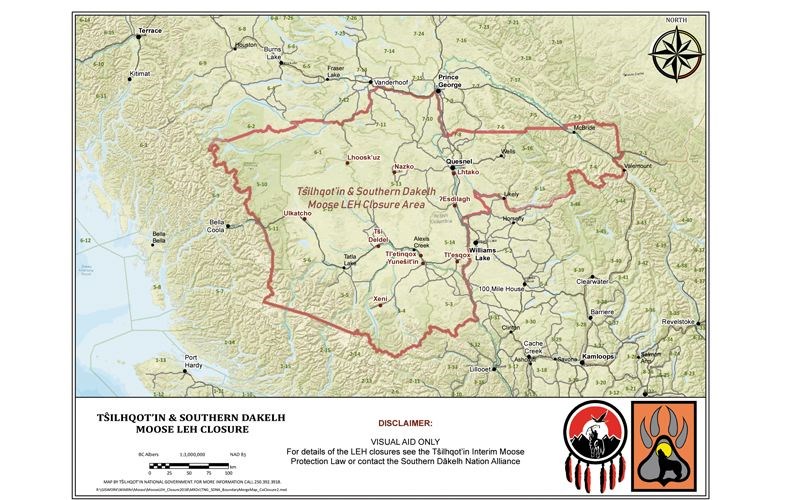Ten Aboriginal communities of the area are asking hunters to refrain from setting their sights on moose south of Prince George this fall.
A consortium of First Nations is urging hunters to use their conservation brains not their trigger fingers on a temporary basis until population numbers recover.
The Tsilhqot'in Nation and Southern Dkelh Nation Alliance (SDNA) announced on Wednesday that they were blocking all limited-entry hunts from a plot of land extending along a northern apex touching from Prince George to Vanderhoof, a western wing extending almost to Bella Coola, an eastern wing extending to McBride and Valemount, and a southern extension almost to Clinton.
"This collaboration comes in response to the dire state of declining moose populations in our territories and the lack of effective action by the province of B.C.," said a joint statement issued by the alliance. "The situation is so dire that many Tsilhqot'in and Dkelh citizens are deciding not to exercise their Aboriginal rights to hunt moose and going without this main source of food for the winter."
The T ilhqot'in communities in this alliance also added that they were banning the hunting of cow moose on their parts of that overall landscape, a decree that applied to Aboriginal and non-Aboriginal alike.
"Conditions are worsening each year," said chief Stuart Alec of the SDNA. "We have the responsibility to do whatever we can to reverse this trend and put moose recovery strategies into place. At this crucial time, we cannot afford to have the pressure on our moose populations increase. We look to the Province and hunters to respect this closure and to aid in our recovery efforts."
Chief Betty Cahoose of the SDNA added that "We have been left with no alternative.... When our moose suffer, our people suffer. We are pleased to work with our neighbours on this vital issue. This isn't about boundaries. This is about preserving and revitalizing a species that is crucial to all of our communities."
Tsilhqot'in chiefs Joe Alphonse and Russell Myers Ross confirmed their support for these measures.
"Doing nothing is not an option. In the wake of the most devastating wildfires in our history, we must take a precautionary approach to wildlife management," said Alphonse, representing a moose-centred traditional diet that now has to rely on store-bought meat and other game food. "It's not right that our members have to make this sacrifice with the province continuing with business as usual."
Myers Ross said "We recognize that the B.C. government has made some efforts to work with us on moose protection and moose recovery, but they are not taking the action that is urgently needed to prevent the decline of moose populations. Moose is an important food source and food security is becoming more significant in the Tsilhqot'in due to the extreme changes in climate and environment.
"With an uncertain future, we look towards a precautionary approach. We have no option but to take the steps needed to protect the moose populations and our way of life. We need to prioritize conservation in this situation to bring the moose population back to a healthy and sustainable level."
These allied First Nations said court challenges were being considered if their conservation measures weren't adhered to.
The SDNA is comprised of the Lhoosk'uz Den Nation, Lhtako Den Nation, Nazko First Nation and Ulkatcho Nation.
The Tsilhqot'in National Government is comprised of the Tl'etinqox, Esdilagh, Yune it'in, Tsi Deldel, Tl'esqox and Xeni Gwet'in communities.
Responses were not obtained by deadline from the provincial government or the Lheidli T'enneh First Nation.



